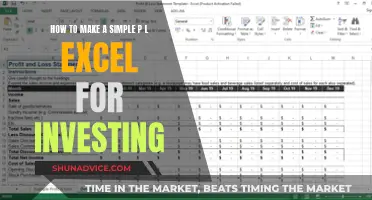
Portfolio Management Services (PMS) is a tailor-made professional service offered to high net worth individuals (HNIs) to cater to their investment objectives. PMS is similar to mutual funds but with a higher degree of customization. While the cost involved in investing in a PMS is comparatively higher, the benefits are numerous. The minimum investment amount for PMS in India is Rs. 50 lakhs, which is a safety measure to ensure that only serious investors with a higher risk appetite opt for this service. PMS offers investors higher control over their portfolio composition and the flexibility to choose or hold stocks, potentially generating higher returns.
| Characteristics | Values |
|---|---|
| Type of service | Portfolio Management Service (PMS) |
| Who is it for? | High Net-Worth Individuals (HNIs) |
| Investment type | Customised solution, similar to mutual funds but with a higher degree of customisation |
| Investment amount | Minimum investment of Rs 50 lakh |
| Investment approach | Aggressive investment approach |
| Investment avenues | Real estate investment trusts, commodities, structured products, debt instruments, foreign assets, equity, fixed income, and commodities |
| Investor control | Higher control on the choice of portfolio composition compared to MF |
| Investor involvement | More involved and proactive decision-making |
| Investor protection | Tighter regulatory control than MF |
| Fee structure | Transparent, flexible, and allows investors to select a fixed or flexible fee structure |
| Taxation | Subject to capital gain tax |
| Paperwork | Tedious paperwork due to strict regulations |
What You'll Learn

PMS vs MF: Which is a better investment option for retail investors?
Portfolio Management Service (PMS) is a tailor-made professional service that caters to the investment objectives of different investor classes. The clients can be individuals or institutions with high net worth. In simple words, a portfolio management service provides professional management of your investments to create wealth.
PMS is provided by professional money managers to informed investors and can be tailored to meet specific investment objectives. PMS providers invest directly in securities through focused portfolios. So one's account will be kept separate and operated according to their investment mandate in a discretionary PMS, where an investment manager takes all decisions in sync with the investor’s goals.
Mutual Funds (MF) are designed by professionals but are not customized. On the other hand, PMS focuses on personalized funds. The managers here have a collaborative strategy for their clients and create portfolios independently, focusing on each client.
MFs offer a wider variety of stocks to choose from and are suitable for those with a smaller corpus and low tax compliance. In contrast, PMS portfolios are tailored to an investor's taste and goals and are suitable for those with a larger corpus that demands customization.
MF is more popular than PMS among retail investors because very small amounts may be invested, and there is a wide choice of funds. An investor may start investing as low as Rs 500 periodically (some funds even allow Rs 1000) through a systematic investment plan (SIP). Moreover, due to the availability of a wide choice of funds, investors may choose funds per their financial goals and risk appetite.
Apart from equity-oriented funds, Asset Management Companies (AMCs) also offer debt-oriented funds and hybrid funds, offering further diversification opportunities for investors.
Compared to MF, PMS offers investors higher control over the choice of portfolio composition as the number of investors is less, and it may be tailor-made for big investors. The minimum investment limit of Rs 50 lakh is also a deterrent for retail investors to invest in equities through PMS.
Therefore, for wealthy investors, investing through good PMS Managers may be a worthy choice, but for retail investors, MF is certainly a better choice.
Understanding Simple Managed Investment Schemes: What You Need to Know
You may want to see also

How does PMS work for an investor?
Portfolio Management Services (PMS) are a form of investment service in India, tailored to the needs of high net-worth individuals (HNIs). PMS offers investors a customised solution, with greater flexibility and higher returns.
PMS is provided by professional money managers, who invest directly in securities through focused portfolios. Each client has a separate bank and demat account, and their account is operated according to their investment mandate. The minimum investment amount is currently Rs 50 lakh, which has been increased over time by the Securities and Exchange Board of India (SEBI) to protect retail investors, as PMS is a high-risk venture.
There are two types of PMS: discretionary and non-discretionary. In discretionary PMS, the fund manager has the freedom to make investment decisions on behalf of the investor, without consulting them. In non-discretionary PMS, the fund manager advises the investor on suitable investments, but the investor makes the final decision.
PMS offers investors higher control over their portfolio composition, as the number of investors is smaller. This means that portfolios can be tailored to individual investors. PMS also provides greater transparency, with regular reporting and access to real-time information on one's portfolio.
PMS is a good option for those who wish to invest a substantial amount for the long term, for example, for retirement. It is important to note that PMS involves a higher risk-reward aspect, as fund managers have more flexibility to choose or hold stocks. This risk can be mitigated through long-term investment.
When choosing a PMS provider, it is essential to understand the fund's philosophy and exercise due diligence in selecting a reputable company with a long track record.
Investment Management WSO: A Lucrative Career Path?
You may want to see also

How is PMS different from MF?
Portfolio Management Services (PMS) and Mutual Funds (MFs) are two of the many ways to invest in equities in India. While both investment options have their own advantages and disadvantages, they differ in several ways.
Risk Involved
PMS is a high-risk, high-reward playing field. It is a custom solution, actively managed by a portfolio manager, and therefore the bias of the manager is bound to influence the portfolio. On the other hand, MFs are classified into 5 risk levels: low, moderately low, moderate, moderately high, and high.
Minimum Investment
The minimum investment requirement for PMS is significantly higher than that of MFs. To invest in a PMS, one needs INR 50 lakhs, while one can start investing in MFs with as little as INR 500.
Account Types
PMS has different demat accounts for different investors, while MFs have money accrued into one large fund from different investors.
Transparency
PMS investors can view every trade, along with the price of each execution and brokerage involved. In contrast, expense-related details are not disclosed in MFs.
Regulations
MFs are rigorously regulated and scrutinized by the Securities Exchange Board of India (SEBI). On the other hand, portfolio details must not be disclosed to regulatory agencies regarding PMS since it is a private cooperation between the investor and the portfolio manager.
Charges
PMS is a more personalized investment experience and therefore attracts higher charges than MFs. PMS charges may include accounting charges, custody charges, brokerage charges, exit load, performance/profit-sharing fees, and management fees.
Investment Approach
MFs offer a wider variety of stocks to choose from, sometimes more than 40-50. PMS, on the other hand, is more curated in terms of taste and goals, usually having not more than 20-30 stocks at one time.
Customization
PMS is a wealth management service that offers better customization and is designed for a targeted group of investors. MFs, though designed by professionals, are not customized.
Tax Compliance
MFs are suitable for those with a smaller corpus who do not want extensive tax compliance. PMS, with its higher fees and taxes, is more suitable for those with a larger corpus.
Savings and Investments: Equation for Financial Success
You may want to see also

What is the risk-reward aspect of PMS?
Portfolio Management Services (PMS) are a high-risk, high-reward investment avenue. The risk-reward aspect of PMS is influenced by various factors, including the structure, investment strategies, and regulatory environment.
Structure
PMS offers a separate bank and demat account for each client, allowing fund managers to make concentrated calls on their high-conviction stocks. This structure provides greater flexibility and the potential for higher returns compared to mutual funds. However, it may also lead to higher risk, which can be mitigated through a long-term investment horizon.
Investment Strategies
The active management of PMS portfolios can potentially yield substantial returns. PMS firms employ fund managers who design portfolios tailored to investors' needs, investment objectives, time frames, and risk tolerance. These managers continuously monitor the market and make strategic adjustments to optimise performance. The dynamic nature of PMS allows for continuous adjustments based on evolving market conditions, enabling fund managers to aim for returns even in volatile markets.
Regulatory Environment
PMS is subject to regulatory changes that can impact their operations and investment strategies. While PMS is regulated by the Securities and Exchange Board of India (SEBI), it is exempt from certain regulatory disclosures as it is a private arrangement between investors and portfolio managers. This lack of public scrutiny may present potential risks.
Fees and Charges
PMS generally has higher expenses and fees compared to mutual funds due to the personalised nature of the service. These fees may include accounting charges, custody charges, brokerage charges, exit load, performance/profit-sharing fees, and management fees. High fee structures can erode a significant portion of the returns generated, and investors should carefully consider the impact of fees on their overall returns.
Other Considerations
PMS portfolios may contain a mix of assets, some of which may not be highly liquid. This lack of liquidity can make it challenging to sell assets quickly during financial stress. Additionally, the success of a PMS depends heavily on the expertise and decision-making ability of the portfolio manager, and poor investment decisions can negatively affect portfolio performance.
In conclusion, PMS offers the potential for high returns but also carries a higher risk compared to other investment options. Investors considering PMS should carefully evaluate their risk tolerance, the fees involved, the liquidity of the assets, and the track record and expertise of the portfolio manager.
Portfolio Investment Strategies: A Guide for Class 12 Students
You may want to see also

How to choose a PMS provider?
Portfolio Management Services (PMS) are a great way to invest a large amount of money, offering greater flexibility and higher returns. When choosing a PMS provider, there are several factors to consider to ensure you make a well-informed decision. Here are some key points to help you select the right PMS provider:
- Basic Checks: It is essential to verify that the PMS provider is registered with the Securities and Exchange Board of India (SEBI). SEBI is the capital market regulator in India, and there are currently around 265 PMS providers registered with them. Operating with an unregistered provider may lead to unnecessary risks.
- Word-of-Mouth Recommendations: Consider seeking feedback from friends and relatives who have already engaged a PMS company. Their firsthand experience can provide valuable insights into the company's working style and overall performance. However, keep in mind that returns may vary from person to person.
- Track Record: Evaluating the track record of various PMS providers is crucial. While comparing returns would be ideal, the lack of publicly available data makes this challenging. Instead, focus on analysing the credibility and reputation of the company. Established brand names with a longer presence in the market tend to have a better track record.
- Initial and Performance Fee: The fees charged by PMS providers vary, and it is important to understand the fee structure. The initial fee depends on the size of your corpus, and it is generally higher for discretionary portfolios, where the fund manager makes all investment decisions. Additionally, consider the performance fee, which is charged if the returns exceed a predetermined level.
- Staff Concerns: Ensure that the PMS provider has dedicated staff specifically for PMS services. This ensures that your portfolio receives exclusive attention and that investment decisions are made with your interests in mind. The knowledge and experience of the staff are also crucial factors.
- Frequency of Disclosure: SEBI mandates PMS companies to disclose their portfolios every six months. However, some companies provide disclosures more frequently, such as quarterly or even daily. Opting for a company with shorter disclosure periods allows you to better track your portfolio and make informed decisions.
- Performance: While there may not be a specific benchmark for PMS, you can use broader market returns, such as those from the Sensex or Nifty, as a reference point, especially if your portfolio is heavy on equities. If the returns do not align with your expectations, it may be a sign to reconsider your choice of provider.
- Investment Mandate and Timing: A good PMS company will strictly adhere to your investment mandate and execute your instructions promptly. Even a slight delay can significantly impact your returns, especially in a volatile market.
- Logic of Investment: Since comparing returns can be challenging, analysing the logic behind investment decisions is a useful way to evaluate PMS providers. Regularly interact with the managers and question their rationale to ensure transparency and avoid any potential foul play.
- Churning: Churning refers to the fund manager frequently buying and selling assets, which incurs additional fees. Some brokerage houses may churn more to generate higher brokerage income, which ultimately erodes returns for investors. Therefore, keeping a close eye on the frequency of churning in your portfolio is essential.
By carefully considering these factors and performing due diligence, you can make a well-informed decision when choosing a PMS provider, maximising your chances of achieving your investment goals.
Investing During a Recession in India: Strategies for Success
You may want to see also
Frequently asked questions
Portfolio Management Service (PMS) is a tailor-made professional service for high net worth individuals (HNIs) to help them meet their investment objectives.
PMS is provided by professional money managers to informed investors and can be tailored to meet specific investment objectives. PMS providers invest directly in securities through focused portfolios. So, an investor's account will be kept separate and operated according to their investment mandate.
Unlike mutual funds, the investors’ assets here are not pooled into one large fund. PMS uses a separate bank account and demat account for each client. The minimum investment amount is Rs 50 lakh for PMS.
PMS helps investors get fruitful returns by diversifying investments across different financial products. It offers a wide variety of investment avenues including real estate investment trusts, commodities, structured products, debt instruments and foreign assets. PMS also offers portfolio customisation, a transparent fee structure, and real-time access to portfolio values, holdings, and expenses.







